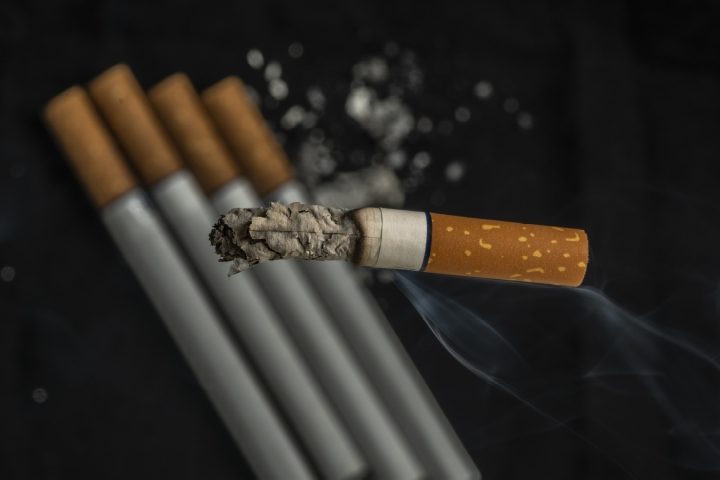
Nelson Hernandez Chitiva/iStock/Getty Images Plus
The follow-the-science Biden administration has indefinitely postponed a plan to ban menthol cigarettes for fear of losing black votes that the president needs to win reelection.
“This rule has garnered historic attention and the public comment period has yielded an immense amount of feedback, including from various elements of the civil rights and criminal justice movement,” Health and Human Services Secretary Xavier Becerra said in a statement Friday. “It’s clear that there are still more conversations to have, and that will take significantly more time.”
How much more time it will take remains to be seen. “Hard to put a timeline on that,” an administration official told CNN.
The administration began considering prohibiting the manufacture and sale of menthol cigarettes in 2021 as part of its Cancer Moonshot initiative. After all, cigarettes are known to be a leading cause of lung cancer, so proscribing some types of them should save lives — especially black lives, since blacks overwhelmingly smoke menthols. According to The Wall Street Journal, Canada’s University of Waterloo “projected that a U.S. ban on menthol cigarettes would prompt 1.3 million smokers to quit, including more than 380,000 Black smokers, in the first four to 23 months after the ban went into effect.” The Campaign for Tobacco-Free Kids claims that a menthol-cigarette ban “would save up to 654,000 lives within 40 years, including the lives of 255,000 Black Americans,” and would “reduce and even eliminate health disparities” between blacks and whites.
According to CNN:
All flavors in cigarettes were banned in 2009, but menthol was left out after lobbying from the [tobacco] industry. The US Food and Drug Administration first said in April 2022 that it would ban the popular mint flavor, setting a deadline of August 2023. In October, the FDA sent final rules to the White House Office of Management and Budget for review, a key regulatory step. It’s still listed as “pending.”
The FDA had set a March deadline for action on the rule, but when there was no movement, a coalition of civil rights and medical organizations sued the agency this month.
The federal government, of course, has zero constitutional authority to ban menthol or any other cigarettes. But since that matters not to President Joe Biden, and since Biden, as American Lung Association spokesperson Erika Sward observed in a statement to CNN, “promised … to follow the science and to reduce deaths and cancer,” what is preventing him from putting the kibosh on Kools?
The administration, represented by Becerra, would like Americans to believe that it is simply taking all affected groups’ concerns into consideration before deciding what to do. However, if the science is clear that outlawing menthol smokes would save lives, why does anyone else’s opinion matter? It certainly didn’t matter when Biden imposed his Covid-vaccine mandates.
“Black voters overwhelmingly backed Joe Biden in 2020, but polls show they aren’t nearly as excited to back him in 2024,” a national Republican strategist told the Daily Caller in December. “The data shows menthol cigarettes are overwhelmingly preferred by Black smokers, so some may perceive this ban as an unfair attack on them. At a time when polls show Biden is in an incredibly tight race, I’m surprised he would risk upsetting such a key constituency by banning menthol cigarettes.”
Apparently, Biden won’t take that chance. Recent Wall Street Journal polls found that just 68 percent of black voters say they’ll cast their ballots for the president in November, down from 91 percent who voted for him in 2020. Biden can’t afford to blow mentholated smoke in the faces of an already shrinking constituency.
The decision to postpone the ban was largely panned by civil-rights groups, lawmakers, and others favoring the FDA’s proposal.
National Association for the Advancement of Colored People (NAACP) President Derrick Johnson said in a Friday statement that his organization is “outraged and disgusted” at the move.
“Let’s be clear — valuing Black lives should not be used as a pawn to get our people to the polls, but rather a platform that our leaders refuse to step down from,” he said.
Representative Robin Kelly (D-Ill.), chairwoman of the Congressional Black Caucus Health Braintrust, told the Journal she was “deeply disappointed that the FDA has chosen to abandon its established plan to ban menthol cigarettes…. This is a common-sense plan which could have saved hundreds of thousands of lives.”
And Dr. Mignonne Guy, a member of the FDA’s tobacco-products advisory committee, told CNN the delay was “unconscionable.”
“We have to question the judgment and the motives and incentives of the individuals that … purport themselves to represent Black communities when they oppose a ban that would save hundreds of thousands of lives now and in the future,” she said.
Not all black leaders are on board with the ban, though. Some said “a ban would expand the illicit market for cigarettes and lead police to racially profile Black smokers,” reported the Journal. “The American Civil Liberties Union and some members of the Congressional Black Caucus expressed similar concerns.” One of those members, Representative Yvette Clark (D-N.Y.), told the paper she was “concerned about how the enforcement of the ban could exacerbate existing, harmful racial bias in our police system.”
Whatever ultimately happens to the menthol-cigarette ban, the incident is proof positive that regulations allegedly designed to protect public health are not the result of dispassionate scientific inquiry, but of patently political posturing.
